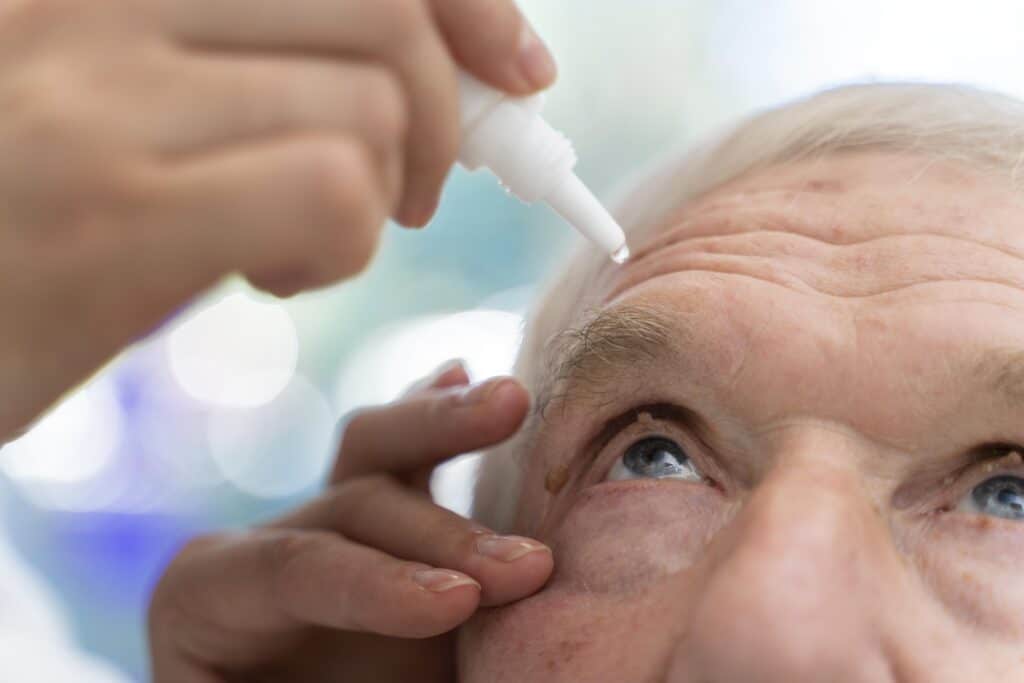Cataract surgery ranks among the most common medical procedures worldwide. Over 20 million people annually undergo this procedure. In the UK, cataract surgery is the most common operation performed by the National Health Service. Pre-pandemic, surgeons in England were performing around 400,000 cataract surgeries per year, with this number increasing to approximately 600,000 operations in England alone for 2022/23.
You’re definitely not alone if you need cataract surgery. A cloudy area in your eye’s lens can blur your vision and lead to sight loss without treatment. Modern cataract eye surgery delivers remarkable results. About 97% of patients see better after the procedure. Your colour perception improves too, as the surgery removes the yellowish or brownish tint from your natural lens.
You might wonder how doctors remove cataracts. Maybe you’re concerned about pain during the procedure. The surgery takes just 20 to 45 minutes with local anaesthetic. You’ll stay awake but won’t feel any pain. Most patients experience minimal discomfort during and after the procedure. Recovery usually takes about four weeks, though you’ll likely see improvements much sooner. This piece explains what you can expect before, during and after your cataract operation. You’ll feel more confident and less worried about your upcoming treatment.

Deciding If Cataract Surgery Is Right for You
The right time to get cataract surgery depends on how much the condition affects your daily life. You have time to think over your options because cataracts don’t need immediate treatment like some other eye problems.
When cataracts start affecting daily life
You should think about cataract surgery when it starts getting in the way of your normal activities. Ask yourself these key questions:
- Can you drive safely, especially at night with headlight glare?
- Do you have trouble reading or watching TV?
- Are everyday tasks like cooking, shopping, or using stairs becoming harder?
- Is it hard to take your medications because you can’t read the labels clearly?
- Does bright light make it harder to see?
A “yes” to any of these questions means it’s time to talk to your eye specialist about surgery options. Many people don’t realise their cataracts’ impact on their independence until after they get treatment.
How your doctor evaluates your need for surgery
Your eye doctor looks at several things to decide if you need cataract surgery: They start with detailed eye tests to check your cataracts’ density and progression. They also review how your vision problems affect your quality of life and daily activities.
Sometimes you might need cataract surgery even with mild vision problems. To cite an instance, your doctor might suggest removal if cataracts make it hard to treat or monitor other eye conditions like diabetic retinopathy or age-related macular degeneration.
Can you delay cataract surgery?
Your eye won’t get damaged if you wait to have cataract surgery, so you have time to make the right choice. In fact, if your vision stays pretty good, you might not need surgery for years, if at all.
But untreated cataracts will get worse. Research in the Canadian Medical Association Journal shows that patients who waited more than six months for cataract surgery had worse outcomes. They experienced more vision loss, lower quality of life, and more falls than those who waited less time. You can often delay surgery safely from a medical standpoint, but there’s no benefit in waiting once cataracts affect your lifestyle. Getting surgery early will give you safer procedure with faster recovery.
Preparing for the Operation: What to Expect Before Surgery

Image Source: Healthline
Getting ready for cataract surgery will give you the best possible outcome. You’ll need to complete several steps before your operation day.
Pre-surgery eye tests and measurements
Your surgeon will take vital measurements of your eye during a pre-operative assessment. This appointment happens a few weeks before surgery and includes several tests:
- A biometric examination shows your eye’s shape and size to help pick the right artificial lens power
- Keratometry readings look at your cornea’s curve to spot any astigmatism
- Vision checks with and without your glasses
- A complete look at both the front and back of your eye
If you wear contact lenses, you’ll need to stop using them before these measurements. Soft lens users should wait 7 days, while hard or gas permeable lens wearers need 4 weeks. Your cornea’s shape changes temporarily with contacts, so this wait helps get accurate results.
Instructions about food, medication, and hygiene
Most patients who get local anaesthetic can eat and drink as usual before surgery. Some facilities might ask you to avoid solid food six hours before the procedure.
You might need to adjust some medications:
- Your doctor may check warfarin levels with an INR test
- Let your surgeon know if you take alpha-blockers for prostate issues
- Diabetic patients on insulin usually get early morning surgery slots
Your surgeon will likely give you antibiotic eye drops to use 1-2 days before surgery. Cleaning your eyelids twice daily for two weeks before surgery helps lower infection risks.
Choosing the right artificial lens
Picking the right intraocular lens (IOL) is a big decision. You have several options: Monofocal lenses are the most common and give clear vision at one distance—usually far away—but you’ll need reading glasses for close work. Multifocal or trifocal lenses can help you see at different distances and might free you from glasses completely.
Toric lenses can fix astigmatism. Premium options like extended depth-of-focus lenses make intermediate vision clearer. Your surgeon will help you pick a lens that fits your lifestyle, vision needs, and budget. Remember that insurance usually doesn’t cover the extra cost of premium lenses.
What Really Happens During Cataract Surgery
Cataract surgery is a straightforward procedure, even though it’s quite sophisticated. A clear understanding of what happens during the operation can help calm your nerves.
How is cataract removal performed?
We used a technique called phacoemulsification for modern cataract surgery. This quickest way breaks up the cloudy lens into tiny pieces with ultrasound waves. The surgeon suctions these fragments out through a small tube. The whole process takes 20-45 minutes. The surgeon then places a clear artificial lens (intraocular lens or IOL) where your natural lens used to be.
Is cataract surgery painful?
You won’t feel any pain during cataract surgery. The doctor numbs your eye completely with anaesthetic drops or sometimes a small injection around it. You stay awake during the procedure but feel nothing more than light pressure or touch.
What do you see during cataract surgery?
About 80% of patients see colours during their surgery. You might see bright lights, blurred shapes, or vivid flashes of blue, red, and other colours. Some patients report seeing patterns or shapes. One artist compared his experience to seeing a “colourful monkey”. Most patients notice light and movement without seeing any surgical details.
Cataract surgery begins with special eye drops to dilate your pupil and a local anesthetic to completely numb your eye. A small clip is placed to keep your eyelid open, eliminating any concerns about blinking during the procedure. The surgeon then creates a tiny incision, measuring just 1-2.5mm, in your cornea. Ultrasound energy is used to break down the cloudy lens, followed by suction to remove all lens fragments. Next, the surgeon inserts a folded artificial lens that naturally unfolds into the correct position. One of the benefits of this minimally invasive procedure is that the small incision heals naturally without requiring any stitches.
- Special eye drops dilate your pupil
- Local anaesthetic numbs your eye completely
- A small clip keeps your eyelid open – no need to worry about blinking
- The surgeon creates a tiny 1-2.5mm cut in your cornea
- Ultrasound energy breaks down the cloudy lens
- Suction removes the lens fragments
- The surgeon inserts a folded artificial lens that unfolds into position
- The cut heals by itself without stitches
Visit Precision Vision London to discuss your cataract surgery. Our team will explain the procedure and ensure you have a safe, comfortable experience.
Also Read: What Really Happens During a Cataract Operation: A Patient’s Complete Guide
Recovery and Aftercare: The Days and Weeks That Follow
Proper aftercare is vital to achieve optimal healing after your cataract procedure. The recovery experience has several stages. You need to follow specific guidelines to get the best outcome.
Cataract surgery recovery time explained
Your vision might be blurry during the first few days after surgery, which is normal. Most patients see most important vision improvements within 24-72 hours. Complete healing usually takes 4-6 weeks. Your eye could feel scratchy, sticky, or uncomfortable during this time.
The healing happens in two distinct stages. The small incision starts closing in the first 24 hours. The smooth barrier beneath the eye’s surface needs several more weeks to heal completely. The white of your eye may look mildly red while the temporarily damaged blood vessels heal.
Using eye drops and protective shields

Eye drops are vital to your recovery. Doctors typically prescribe three main types:
- Antibiotic drops to prevent infection (usually used for about one week)
- Anti-inflammatory drops to reduce swelling (used for 3-6 weeks)
- Lubricating drops to help with dryness and discomfort
Make sure to apply these drops exactly as directed with clean hands until your follow-up appointment. You’ll also need to wear a protective eye shield for at least one week, especially while sleeping. This shield prevents accidental rubbing or pressure on your healing eye.
During your recovery period, it’s essential to avoid certain activities to ensure successful healing after your eye procedure. You should refrain from swimming, using hot tubs, or visiting saunas for 4-6 weeks. Do not drive until your vision meets DVLA requirements, which typically takes 3-4 days. Avoid wearing eye makeup for approximately 4 weeks. For the first 48 hours, do not bend over or put your head below waist level. Throughout the healing process, it’s crucial that you don’t rub or touch your eye.
Key activities to avoid during healing: • Swimming, hot tubs or saunas for 4-6 weeks • Driving until your vision meets DVLA requirements (typically 3-4 days) • Wearing eye makeup for approximately 4 weeks • Bending over or putting your head below waist level for 48 hours • Rubbing or touching your eye
When to call your doctor
Call your ophthalmologist right away if you notice:
- Severe or worsening eye pain that over-the-counter medication doesn’t help
- Sudden vision changes or loss
- Increased redness, swelling or discharge
- Flashing lights or new floaters
- Persistent blurry vision after the initial recovery period
Precision Vision London offers one-on-one consultations to help you understand the procedure. We ensure a safe and comfortable experience for your cataract surgery.
Conclusion
Final Thoughts: Embracing Clearer Vision After Cataract Surgery
Cataract surgery ranks as one of the most successful medical procedures worldwide. It delivers amazing results for millions of patients each year. This piece has covered every step of what happens during a cataract operation—from the right time for surgery to what you can expect during recovery. Your trip starts when cataracts affect your daily activities like driving, reading, or managing medications. Your eye specialist will run complete testing to find the best approach for your specific needs. The right measurements before surgery will ensure you get the perfect artificial lens, and good preparation helps reduce risks.
The procedure takes less than an hour with minimal discomfort. You’ll feel only pressure while seeing interesting patterns of light and colour during the operation. The modern phacoemulsification technique uses tiny incisions that heal without stitches. Most people recover faster, and their vision improves within days. Notwithstanding that, complete healing takes 4-6 weeks while you follow aftercare instructions carefully. Your prescribed eye drops play a key role in the healing process.
Without doubt, eye surgery might seem scary. But cataract removal is one of the safest surgical procedures today. Most patients get dramatically better vision that reshapes their quality of life. Colours look brighter, details become sharper, and many activities become fun again. Note that millions get this procedure every year, but your experience remains unique to you. Then asking questions, following medical advice, and going to all follow-up appointments will give you the best possible outcome for your eyes and vision. If you’re getting ready for surgery soon or just learning about what’s ahead, clearer vision waits on the other side of this common yet life-changing procedure.
FAQs
Q1. Is cataract surgery a painful procedure? Cataract surgery is generally painless. Your eye will be numbed with anaesthetic drops or a small injection. You may feel slight pressure or touch during the procedure, but most patients experience no pain. After surgery, mild discomfort can usually be managed with over-the-counter pain relief.
Q2. What can I expect to see during cataract surgery? During cataract surgery, you’ll likely see bright lights, blurred shapes, or vivid colours. About 80% of patients report seeing colourful patterns or flashes. You won’t see any surgical details, just general light and movement.
Q3. How long does cataract surgery take? The actual cataract removal procedure typically takes between 20 to 45 minutes. However, you should plan to spend a few hours at the surgical centre for preparation and initial recovery.
Q4. How soon after cataract surgery will my vision improve? Most patients notice significant vision improvement within 24 to 72 hours after surgery. However, complete healing and stabilisation of vision can take 4 to 6 weeks.
Q5. What precautions should I take during recovery from cataract surgery? During recovery, avoid swimming and hot tubs for 4-6 weeks, refrain from driving until cleared by your doctor, avoid eye makeup for about 4 weeks, and don’t rub your eye. You’ll need to use prescribed eye drops and wear a protective eye shield, especially while sleeping, for at least a week.
Authors & Reviewer
-
 Olivia: Author
Olivia: AuthorHi, I'm Olivia, a passionate writer specialising in eye care, vision health, and the latest advancements in optometry. I strive to craft informative and engaging articles that help readers make informed decisions about their eye health. With a keen eye for detail and a commitment to delivering accurate, research-backed content, I aim to educate and inspire through every piece I write.
-
 Dr. CT Pillai: Reviewer
Dr. CT Pillai: ReviewerDr. CT Pillai is a globally recognised ophthalmologist with over 30 years of experience, specialising in refractive surgery and general ophthalmology. Renowned for performing over 50,000 successful laser procedures.

